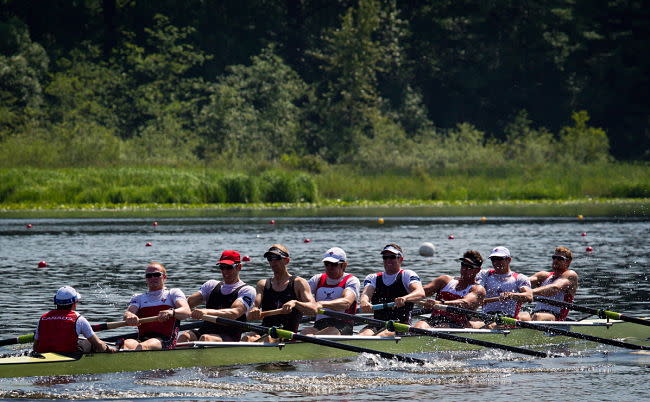As Canadian medal counts go up, sport participation goes down
One of the sustaining illusions about the Games is there's an Olympic bounce. If a Canadian wins a medal in a particular discipline, ergo, participation in said discipline will go through the roof, which is why high school skeleton leagues popped up all over the place after Jon Montgomery's win in Vancouver.
Of course, that didn't happen, because the opposite is true. It's well-known that participation in sports in Canada has dropped from nearly half of the population in the early 1990s to less than a third by the middle of the last decade. It means we don't have immunity when Americans and the English play the "nooooo, your people are more slothful" parlour game (which everyone can play, you don't even have to get off the couch). On top of that, Peter Donnelly of the Centre for Sport Policy Studies, who presenting findings last fall concluding, "the more medals we win, the fewer Canadians participate in sport" points out prohibitive costs means Canada's national sports organizations don't get a grassroots boom after a medal win. Essentially, the Olympics don't cause people to become more active; London 2012 organizers had to admit they failed to get Britons up and active.
Interviews were carried out with 21 national sport organizations whose athletes had won an Olympic medal in the previous 10 years. Nineteen reported they had experienced no "Olympic bounce" in participation, one was not sure, and one experienced a short-term increase in interest precisely because the winning athletes had been sent on a cross-country tour to promote participation (that increase ended as the funding ran out).
Lack of capacity is a two-sided problem. On the one hand, many of our sports have limited facilities and a limited number of personnel who are qualified to teach new participants. The available facilities and personnel are often committed to national team athletes and those on the high performance development track.
At the same time, participation in many sports involves costs in terms of time and money that are beyond the capacity of significant numbers of Canadians.
We may not have reached the situation of the U.K. where it is estimated that perhaps half of their London Olympic team (and some two-thirds of their medal winners) will be drawn from the 7 per cent of the population that went to private school. But despite the financial hardships faced by many of our Olympic athletes, they are often from families with the capacity to have supported them through their early development in a sport. (Toronto Star)
On some lower level, it's acceptable that public funding for Canadian athletes is all about the medals and living vicariously through athletes who are largely out of sight and out of mind in non-Games years. No one is going to be so coldly rational to deny getting a charge out of seeing this country win. There is an opportunity cost to society (is that still a thing?) when sport becomes all about developmental compression, pushing a select few to the top.
Why does this go on? The Olympics still have a strong nationalistic appeal, even though affluent countries with large populations inevitably top the medal standings, with Norway and Sweden being shining exceptions. (Short answer for that: high taxes and a very tall population, on average.)
Donnelly and his fellow authors also note the IOC is a big part of the con. Because the cost of staging an Olympics has gone through the roof since 1976, namely due to well-stoked security fears, more taxpayers' money has been needed to put on the Games. Thus the assurance there would be a social benefit from it — i.e., a sportier population.
That obviously doesn't happen in Canada, due to cost and the limited capacity a lot of niche sports have for someone who just wants to take part to have fun, be social and be in a shape. It's also worth pointing out the allotment of federal funding is completely disconnected from mass participation. Sliding sports, where there are multiple medals available to justify the Own The Podium wonks' work, get almost as much funding as Canada Basketball. You could look it up.
What can be done about it? Well, snicker whenever you read that, say, bringing the Games to Toronto would inspire untold numbers of children. Then get some exercise; who needs an organized sport to be active, anyway?
Neate Sager is a writer for Yahoo! Canada Sports. Contact him at neatesager@yahoo.ca and follow him on Twitter @neatebuzzthenet.

 Yahoo Sports
Yahoo Sports 


